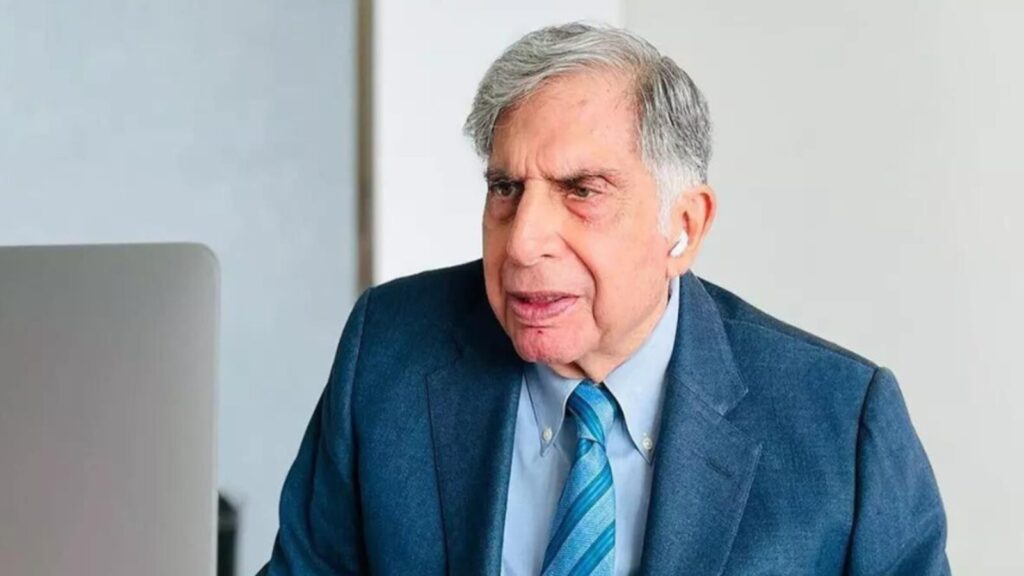Ratan Tata, the former chairman of Tata Sons, is a well-known businessman and philanthropist. His journey from inheriting a commercial empire to building it into a global conglomerate is one of vision, resilience, and steadfast adherence to ethical values. Under his leadership, the Tata Group not only achieved unprecedented heights, but also maintained a strong commitment to social responsibility and ethical business practices.
Ratan Tata Early Life and Education
Ratan Naval Tata was born on December 28, 1937, in Mumbai, India, into the prestigious Tata family. He was the great-grandson of the Tata Group’s founder, Jamsed ji Tata. Ratan Tata’s parents split up when he was ten years old. And he was raised by his grandmother, Lady Navajbai Tata. Despite the family upheaval, he shown great perseverance and commitment to his studies. In 1962, he earned a degree in architecture and structural engineering from Cornell University. And in 1975, he enrolled in Harvard Business School’s Advanced Management Program.
Ratan Tata Early Career and Rise to Leadership
Ratan Tata began his career in the Tata Group in 1961, working on Tata Steel’s factory floor. Shoveling limestone and operating the blast furnaces. This hands-on experience helped him gain a thorough grasp of the industry from the ground up. His early years were defined by modesty and a desire to study the subtleties of the industry.
Ratan Tata took over as chairman of Tata Sons after J.R.D. Tata stepped down in 1991. At the time, the Tata Group was a large conglomerate with a diverse portfolio of businesses, many of which were underperforming and lacked a clear strategy. Ratan Tata launched a goal to restructure the company’s operations, divest non-core assets, and invest in high-growth industries.
Ratan Tata Transformation of Tata Group

One of Ratan Tata’s most notable accomplishments was the global expansion of the Tata Group. Under his tenure, the corporation acquired many high-profile businesses, including Tetley Tea in 2000, Daewoo’s truck manufacturing unit in 2004, Corus Group (an Anglo-Dutch steelmaker) in 2007, and the legendary Jaguar Land Rover in 2008. These acquisitions not only increased the Tata Group’s global presence, but also broadened its business portfolio.
Ratan Tata was also influential in the 2008 debut of the Tata Nano, which was marketed as the world’s cheapest car. While the Nano did not meet commercial expectations, it displayed Tata’s dedication to innovation and his aim of making car ownership available to the masses in India.
Philanthropy and Social Responsibility
Beyond business, Ratan Tata is well-known for his humanitarian endeavors. Under his leadership, the Tata Group supported a variety of social causes, including healthcare, education, and rural development. Ratan Tata himself donated large sums to charity causes, and the Tata Trusts, which own a majority interest in Tata Sons, have spearheaded a number of philanthropic efforts.
One significant aspect of his charity is his support for education and research. Ratan Tata donated $50 million to Harvard Business School, which named Tata Hall in his honor. He also helped the Indian Institute of Technology in Bombay establish the Tata Center for Technology and Design, which focuses on creating engineering solutions to societal concerns.
Legacy and Leadership Style
Ratan Tata’s leadership style is distinguished by humility, sincerity, and a strong sense of responsibility to society. He is noted for his hands-on attitude, willingness to take calculated risks, and dedication to sustaining the Tata Group’s core values of trust and ethical business practices.
His retirement in 2012 signaled the end of an era, yet his legacy continues to motivate future generations of entrepreneurs and business executives. Even after retirement, Ratan Tata is still involved in the business sector, coaching startups and young entrepreneurs through projects such as Tata Trusts’ Social Alpha and RNT Associates.
Conclusion
Ratan Tata’s success story demonstrates his innovative leadership, ethical ideals, and continuous devotion to social concerns. His ability to build the Tata Group into a global powerhouse. While upholding its core ideals of honesty and social responsibility has left an indelible imprint on the corporate world. Ratan Tata is a source of inspiration. Demonstrating that true success is defined not just by financial accomplishments but also by making a positive impact on society.
Read more:- Sandeep Gajakas Become A Millionaire By Polishing Shoes



